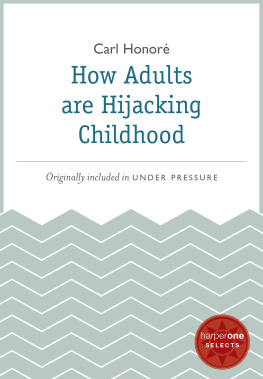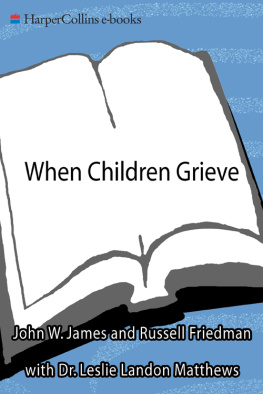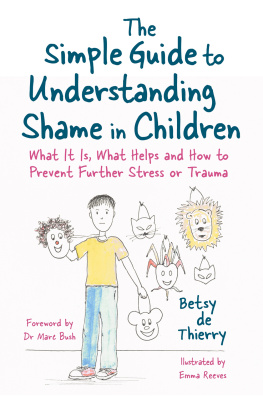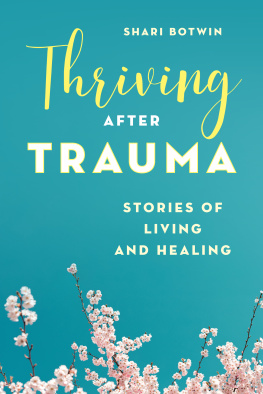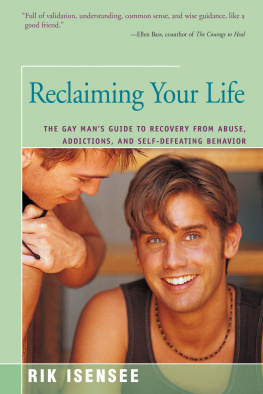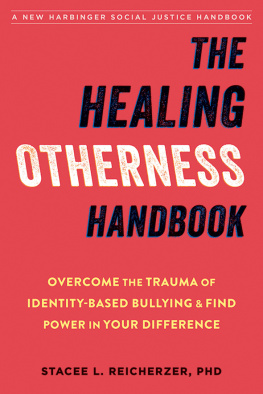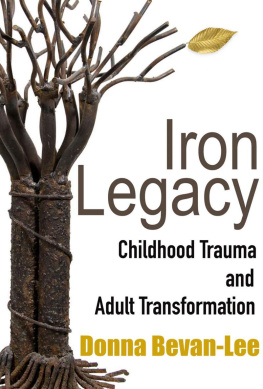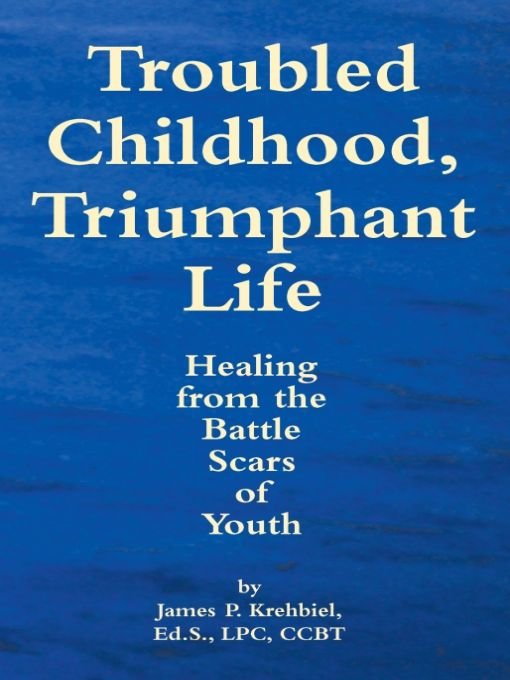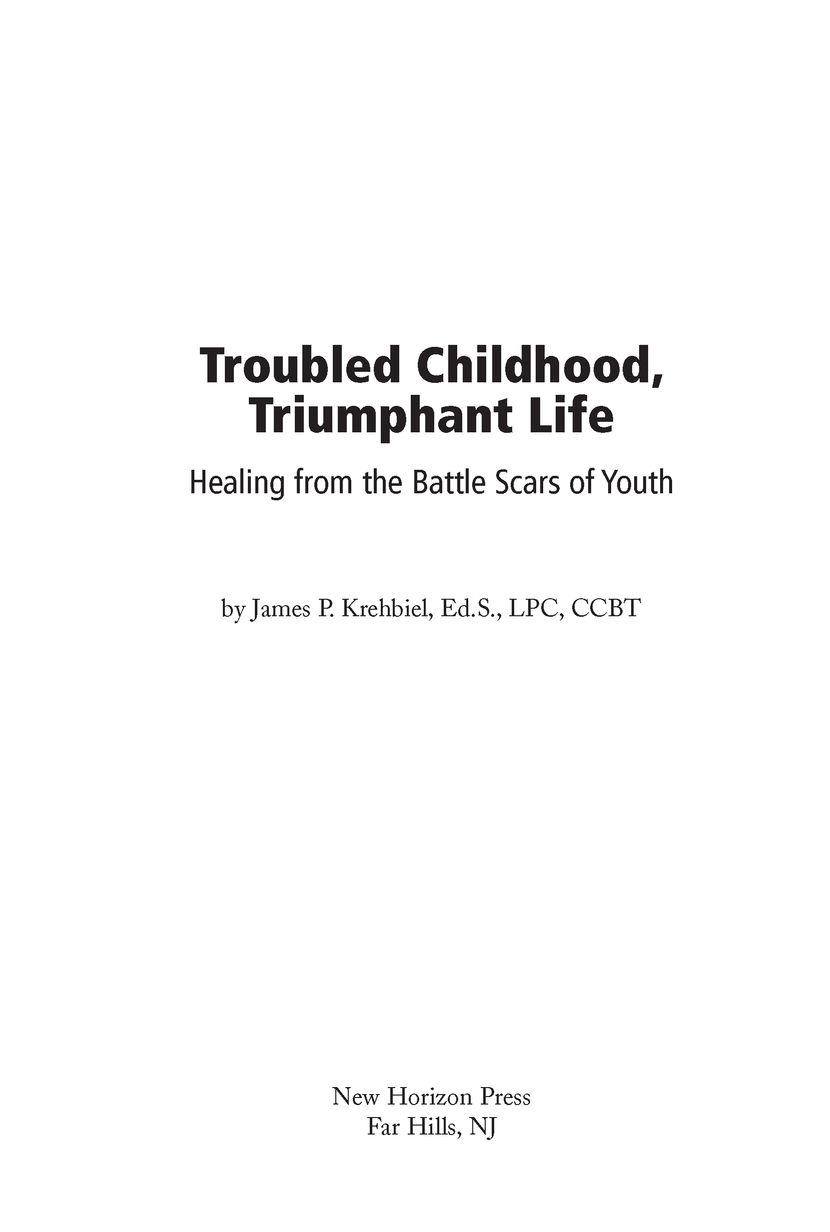Table of Contents
To Gladys, my beloved mother, who was a hoot.
Authors Note
The narratives and events described in this book are drawn from my professional experience as a therapist. The examples are intended to illustrate actual patterns of thinking and behavior. However, all of the cases therein are composites. They have been deliberately altered in order to protect peoples right to confidentiality and privacy.
The information in this book is offered for general educational purposes only. This information should not be used for diagnosis, nor should it be considered a replacement for consultation with a healthcare professional. For purposes of simplifying usage, the pronouns his/her and s/he are sometimes used interchangeably.
Acknowledgments
My mother was the most devoted book peddler a guy could have. She carried my first work, Stepping Out of the Bubble, in the basket of her walker. She proudly talked it up with everyone she encountered in her independent living facility. Unfortunately, she broke her hip in July of 2008 and needed an immediate operation. On the big day, I gave her a peck on the cheek, and she was off to surgery. On her way to the operating room, she turned her head my way and jokingly said, Good luck on your new book. I hope its a success! Sadly, two weeks later she died of bronchial pneumonia.
In addition to my mother, I want to thank Dr. Sherry Henig, a New York child psychologist and author of Sara Makes Her Mother Proud and Learns Good Behavior. She provided support and valuable feedback toward improving my manuscript. Next I want to thank Samantha V. Chang, New York journalist and co-owner of TheImproper.com, the upscale arts, entertainment and lifestyle Web magazine. Samantha graciously consented to script the preface to this work. She also supported me in the editing process, including some rather creative section subtitles.
Most importantly, this work would not have been fulfilled without the guidance, feedback and endless hours of editing provided by my wife, Dr. Andrea Freed-Krehbiel. As an educational consultant and former English teacher, she was well-suited to provide the kind of assistance I needed. The devotion, affirmation, support and editing assistance I received from her throughout this project will never be forgotten.
Preface
We live in interesting times. Thanks to technology such as cell phones, e-mail and the Internet, we can sometimes become closer to people who live thousands of miles away than to our own next-door neighbors. Such is the case with James P. Krehbiel, the Arizona-based author of this book, and me, a New York-based journalist.
James and I live on opposite ends of the United States but became fans of each others works on a writers Web site. I wrote an item and was pleasantly surprised when he left an encouraging comment in response to it. This led me to read James writing, and Ive been a fan of his insightful prose ever since.
Through reading his penetrating articles, I discovered that James is a noted therapist with his own practice who had previously published a book called Stepping Out of the Bubble: Reflections on the Pilgrimage of Counseling Therapy. Won over by his deep concern for and understanding of the human psyche, I asked James to write his own column for TheImproper.com, an arts and entertainment Web site I co-own.
Since then, James has penned numerous discerning columns covering a wide range of moving topics, such as the alarming rates of suicide among Iraq War veterans and the roots of addictive behavior. In his latest book, Troubled Childhood, Triumphant Life: Healing from the Battle Scars of Youth, James addresses an important issue with far-reaching consequences: how the faulty thinking we develop as a result of family dynamics can haunt us throughout our entire adult lives.
When I was a child, I believed in Santa Claus, the Tooth Fairy and certain immutable principles, such as if you do the right thing, bad things wont happen. These were ideas fostered by my family throughout childhood. Nevertheless, life soon taught me that bad things do happen to good people and that not everything happens for good reasons.
One of my most tightly held faulty childhood expectations was that achievement went hand-in-hand with personal satisfaction and happiness. As a result, I spent my childhood and much of my young adulthood trying to get good grades, getting a top-notch college education, completing law school and working at fancy-schmancy media groups in New York.
Fast-forward many years later and Ive learnedthrough both painful self-analysis and difficult personal and professional experiencesthat being happy has little to do with outward success, such as making lots of money, living in a fancy home or hobnobbing with so-called elite people.
My childhood myth that being rich, famous or successful guarantees happiness has been shot to pieces. After having lived in Manhattan for almost two decades and having rubbed elbows with the super-accomplished professionals and wealthy celebrities, I understand the fleeting nature of success and happiness. Imagine my shock as a bright-eyed, idealistic twenty-something when I discovered that some of the unhappiest and most imbalanced people were successful, wealthy and/or famous. I know it sounds like such a cliche revelation, but the epiphany was revolutionary for me as a young adult.
Once you realize that the people and ideals you had placed on pedestals for years are mere illusions, its easy to become cynical and bitter. You ask yourself how you could have been so naive and wonder how youll ever be able to achieve your own sense of inner peace and happiness if the road map you were following suddenly got ripped to shreds.
Fortunately, the moment that you make an eye-opening realization about a long-held belief is often the time you look within and find your own truth. Ive learned that personal satisfaction and happiness come from spending time with family and friends, letting go of toxic beliefs and people, keeping an open mind and cultivating hobbies that I enjoy.
The moment that one lets go of the magical (but oftentimes distorted) illusions of childhood is both scary and awesome. Its at that moment you look inside yourself and discover who you are and what makes you tick. Its only through self-understanding that one can become spiritually free and happy; I believe James new book can help point you toward that moment. I congratulate him on a breathtaking achievement and you, the reader, on your own journey of self-discovery.
Samantha Chang
Journalist and Editor
New York City, 2009
Introduction
Many parents are not adequately equipped for the task of caretaking for their children. Their prior experiences, emotional unavailability and cultural roadblocks may affect their capacities to be supportive and nurturing. Parents generally do the best they can, many under difficult circumstances. One can offer a variety of reasons to explain and justify ineffective parenting behavior. But exploring the etiology of a parents negative child-rearing patterns in no way reduces the emotional pain that children experience as a result of poor parenting.
Well explore the paths of children who experienced the perils of ineffective parenting and have found ways to transcend the past and take responsibility for the present. The purpose of this work is not to be a treatise or indictment of dysfunctional parenting. It is imperative that in our search for adulthood, we eventually see our parents as bigger than their limitations.


